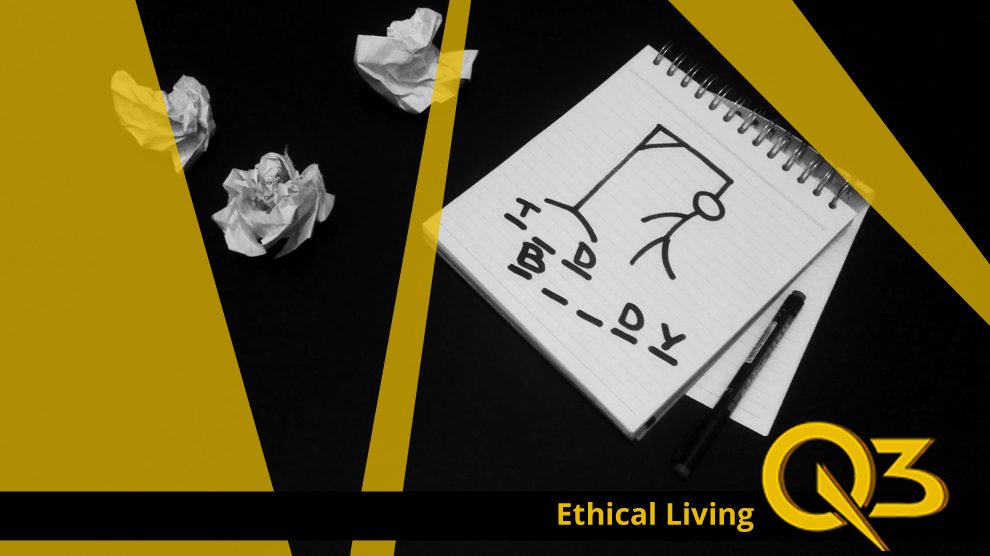by Katie Waits
ÔÇ£Vengeance is what the death penalty really is. Really, itÔÇÖs a desire of society to take an eye for an eye. And I guess thereÔÇÖs no cure for that.ÔÇØ ÔÇô Ted Bundy, Conversations with a Killer![]()
We are all probably aware of what the death penalty is. Chances are, you have some sort of an opinion about it. A discussion about the death penalty is sure to bring about questions of ethics and morality, whether you believe in it or not. Many factors have to be taken into account: innocence, the type and severity of the crime committed, religion, mental health. Was it an act of terrorism, murder or rape? ItÔÇÖs hardly a matter of simple debate. And if youÔÇÖre anything like me, itÔÇÖs likely you have taken an interest in true crime at some point. Reading articles and watching documentaries about murderers and the acts they have committed, while horrifying, is nonetheless intriguing. ItÔÇÖs extremely difficult to comprehend, especially after seeing how a terrible act affects the victimÔÇÖs loved ones.
With the release of the spine-chilling new Netflix series, Conversations with a Killer: The Ted Bundy Tapes, we are reminded of how the cruel actions of one person can affect an entire country. So much so that when Bundy was due to be executed, after receiving three death sentences, the American public rejoiced. Hundreds of Americans gathered outside Florida State Prison to get drunk, waving banners and chanting ÔÇÿburn, Bundy, burnÔÇÖ, until he eventually died. Souvenirs were even sold. The country breathed a sigh of relief. But should such a celebration have occurred? Even more controversially, was it right to end BundyÔÇÖs life like that?
Frères humains qui après nous vivez,
NÔÇÖayez les cuers contre nous endurcis,
Car, si piti├® de nous povres avez,
Dieu en aura plus tost de vous mercis.
Fran├ºois Villon ÔÇô Ballade des pendus
![]() This poem is featured as an epigraph in Truman CapoteÔÇÖs book, In Cold Blood, which details the true story of the brutal murder of the Clutter family in 1950s America. The murderers, Dick Hickock and Perry Smith, spent five years on death row with several other killers. Capote, determined to finish his book, stayed in touch with Smith and Hickock. When they were eventually hanged on the 14th April 1965, CapoteÔÇÖs life had been disturbed by these men. The result was a book, displaying the murderers in an unusual way ÔÇô as human beings. Translated into English, the poem reads:
This poem is featured as an epigraph in Truman CapoteÔÇÖs book, In Cold Blood, which details the true story of the brutal murder of the Clutter family in 1950s America. The murderers, Dick Hickock and Perry Smith, spent five years on death row with several other killers. Capote, determined to finish his book, stayed in touch with Smith and Hickock. When they were eventually hanged on the 14th April 1965, CapoteÔÇÖs life had been disturbed by these men. The result was a book, displaying the murderers in an unusual way ÔÇô as human beings. Translated into English, the poem reads:
Brothers, men who live after us,
Have your hearts not hardened against us,
For if on poor us you take pity,
God will sooner show you mercy
The Ballad of the Hanged Men![]() It seems to make an interesting case against the use of the death penalty ÔÇô asking us to take pity on those sentenced to death, so that we can improve ourselves in the eyes of God. Through detailing the emotions, thoughts and interests of the murderers as well, Capote seemed ask readers a tough moral question ÔÇô can we completely justify the use of the death penalty?
It seems to make an interesting case against the use of the death penalty ÔÇô asking us to take pity on those sentenced to death, so that we can improve ourselves in the eyes of God. Through detailing the emotions, thoughts and interests of the murderers as well, Capote seemed ask readers a tough moral question ÔÇô can we completely justify the use of the death penalty?
On one hand, it could be argued that no, we canÔÇÖt justify it. As surprising as it may seem, those on death row are human beings, capable, to some extent, of feeling emotions, just like we do. Also, there have been cases where innocent people have been wrongly convicted of a crime. Some are fortunate that new evidence arises, others arenÔÇÖt so lucky. In regards to the case of Ted Bundy, he definitely was not innocent. A suspicious-looking man repeatedly targeting young girls to ask for help in his brown Volkswagen Beetle didnÔÇÖt go unnoticed. After he had been pulled over while speeding, police put him under surveillance, finding more evidence against him. Upon searching his Beetle, hair was discovered, matching three victims and he was soon identified by a woman he tried to kidnap. It escalated from there.
Yet there are still factors that are highlighted by NetflixÔÇÖs documentary, posing an argument against BundyÔÇÖs sentence. For example, he acted as his own co-council in court and seemed to sabotage his own defence. Should his misunderstanding of the law have been taken into account, or were his actions just plain arrogance deserving of punishment?
ÔÇÿAn eye for an eyeÔÇÖ is a phrase often associated with the death penalty, setting a principle that a person who has hurt another should be punished to a similar degree. In some situations, this seems justifiable. Murder, abuse, terrorism ÔÇô each are crimes which result in the suffering of innocent people. Some may say it is right to execute these people. If we do not implement a severe punishment, these violent acts will continue as the offenders know that they will not get an extreme sentence. I once heard someone say ÔÇÿa civilised society is seen as a soft oneÔÇÖ. In other words, we canÔÇÖt threaten too many people with a life sentence; lots of criminals end up living a good life in prison. A harsher punishment could be carried out instead, to show that brutal crimes will not be tolerated ÔÇô to make the offender suffer as their victim did. But could this make the justice system as bad as the criminal? Alternative punishments are available: make prison life strict, a life of reform, regimentation and hard manual work. Contradicting the first phrase, why donÔÇÖt we consider turning the other cheek? It may seem to some that we, in applying this punishment, are wrongly playing the role of God. But then again, isnÔÇÖt that what a murderer has done in taking the life of another?
The argument of the death penalty is endless. It can be countered over and over again in many ways. BundyÔÇÖs prosecutor, George Dekle, in the documentary seemed to show an internal argument: ┬áÔÇÿIÔÇÖm ashamed to admit that I was elated. I hope IÔÇÖm never happy over the death of another human being ever againÔÇÖ. The death of a horrific criminal brings satisfaction and joy, but then guilt and disgust over those feelings. ItÔÇÖs such an emotionally, morally challenging debate that it seems that a conclusion that satisfies everyone is always going to be impossible.












